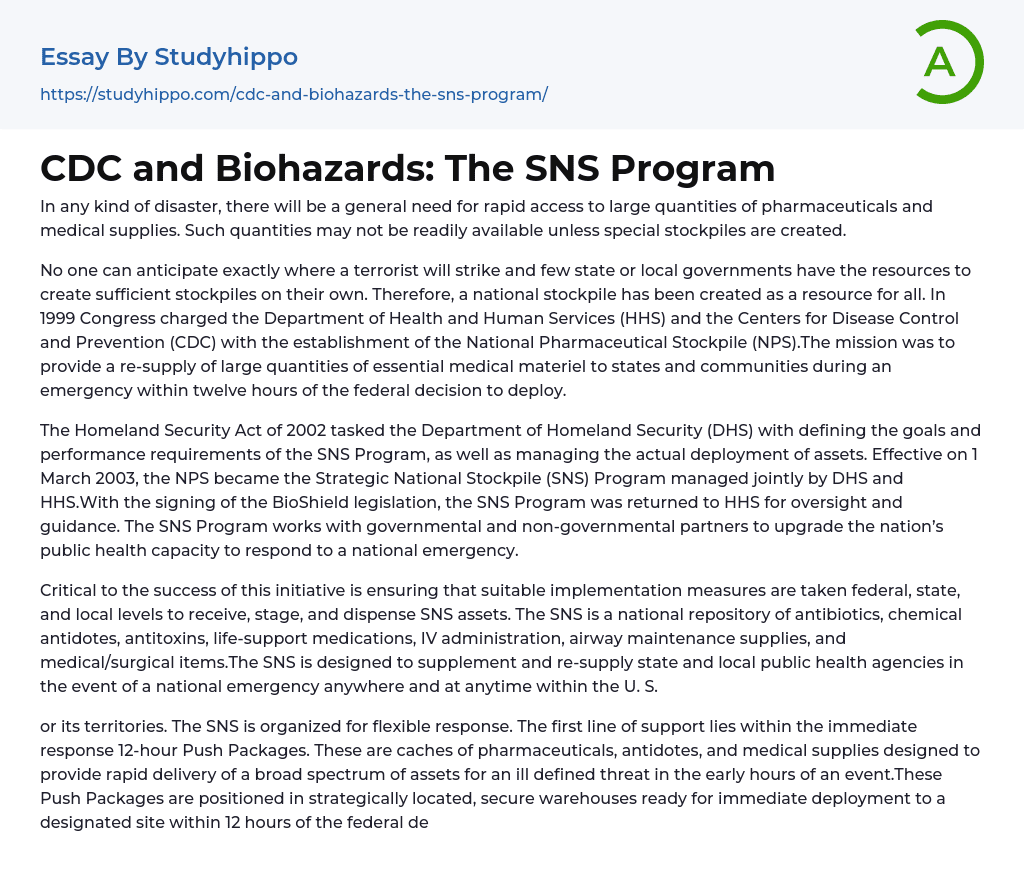Local and state governments have struggled to keep enough supplies for terrorist attacks, so a national stockpile was created. In 1999, the Department of Health and Human Services (HHS) and the Centers for Disease Control and Prevention (CDC) were tasked by Congress to establish the National Pharmaceutical Stockpile (NPS). The NPS is meant to provide large amounts of medical resources to states and communities within 12 hours in emergency situations.
Established via the Homeland Security Act of 2002, the SNS Program (formerly known as NPS) aims to enhance preparedness for public health crises. The DHS developed program objectives and operational standards and oversaw asset deployment until joint management with HHS beg
...an on March 1, 2003. With the passage of BioShield legislation, the responsibility for overseeing and guiding the SNS Program was fully transferred to HHS. Collaborating with governmental and nongovernmental entities is a critical element of the SNS Program's initiatives.
To ensure the success of the project, it is crucial to implement measures at all levels - federal, state, and local - for managing the retrieval, preparation, and distribution of resources from the Strategic National Stockpile (SNS). This stockpile includes medical supplies such as antibiotics, chemical antidotes, antitoxins, life-support medications, IV equipment, airway maintenance supplies and medical/surgical materials. The SNS serves as a supplement to provide support and resupply to state and local public health agencies in times of national emergency in the United States.
The SNS is structured to have adaptable reactions in response to an uncertain threat
in the United States or its territories. The initial support is offered through the 12-hour Push Packages, which store medicines, antidotes, and medical equipment for expeditious delivery to an affected area during the early stages of a crisis. These packages are securely stored in key locations and can be dispatched to a specified site within 12 hours of federal decision to deploy SNS assets.
In the event that extra medications or medical supplies are needed, the subsequent vendor managed inventory (VMI) supplies will be sent and should arrive no later than 36 hours after the incident. If the agent is well defined, then the VMI can be customized to provide specific pharmaceuticals, supplies, and/or products needed for the suspected or confirmed agent(s). This makes VMI an ideal immediate response option for the SNS Program. To ensure that the SNS Program assets are adequate and up-to-date, HHS and CDC take into account various factors such as current biological and/or chemical threats, availability of medical supplies, and ease of pharmaceutical dissemination.
The medical vulnerability of the U.S. civilian population plays a major role in determining SNS composition. To maintain the potency shelf-life limits, the SNS Program conducts quarterly QA/QC checks on all 12-hour Push Packages, an annual 100% inventory of all items, and inspections of environmental conditions, security, and overall package maintenance.
During an emergency of national proportions, medical supplies from the state, local, and private sectors will run out rapidly. The SNS provides support to state and local officials in responding to such emergencies with a combination of VMI or a 12-hour Push Package, depending on the situation. However, it is essential to note that the SNS
is not an initial response tool. The SNS Program is fully committed to distributing 12-hour Push Packages to any location within the United States.
Within 12 hours of a federal decision to deploy, Push Packages are available for immediate loading onto trucks or commercial cargo aircraft for rapid transportation to states or territories. Simultaneously, the Technical Advisory Response Unit (TARU) will deploy to coordinate with state and local officials, ensuring efficient reception and distribution of SNS assets upon arrival. Once the SNS materiel arrives at the designated receiving and storage site, HHS transfers authority to state and local authorities.
After the 12-hour Push Package is received, state and local authorities will distribute it with assistance and guidance from SNS TARU members who will remain on site. The decision to deploy SNS assets will be based on signs indicating the overt release of an agent that could negatively impact public health or more subtle indicators like unusual morbidity and mortality detected through the nation's epidemiology network. In the event of a biological or chemical incident or national emergency, the affected state's governor's office should request the deployment of SNS assets directly from CDC or HHS. The situation will then be assessed by HHS, CDC, and other federal officials who will determine a prompt action plan.
- Hospital essays
- Physician essays
- Health Care Provider essays
- Universal Health Care essays
- Readmission essays
- Business Law essays
- Contract essays
- Consumer Protection essays
- Property essays
- Ownership essays
- Agreement essays
- Common Law essays
- Contract Law essays
- Justice essays
- Security essays
- Tort Law essays
- United States Constitution essays
- Crime essays
- Lawsuit essays
- Treaty essays
- Family Law essays
- Marijuana Legalization essays
- Constitution essays
- War on Drugs essays
- Court essays
- Jury essays
- Police essays
- Protection essays
- Community Policing essays
- Criminal Law essays
- Judge essays
- Lawyer essays
- Employment Law essays
- Copyright Infringement essays
- Injustice essays
- Intellectual Property essays
- Breach Of Contract essays
- Jurisprudence essays
- Social Injustice essays
- Juvenile Justice essays
- Internet Privacy essays
- Cyber Security essays
- Bill Of Rights essays
- Civil Liberties essays
- First Amendment To The United States Constitution essays
- Fourth Amendment To The United States Constitution essays
- Second amendment essays
- Animal Cruelty essays
- Law Enforcement essays
- Juvenile Justice System essays




